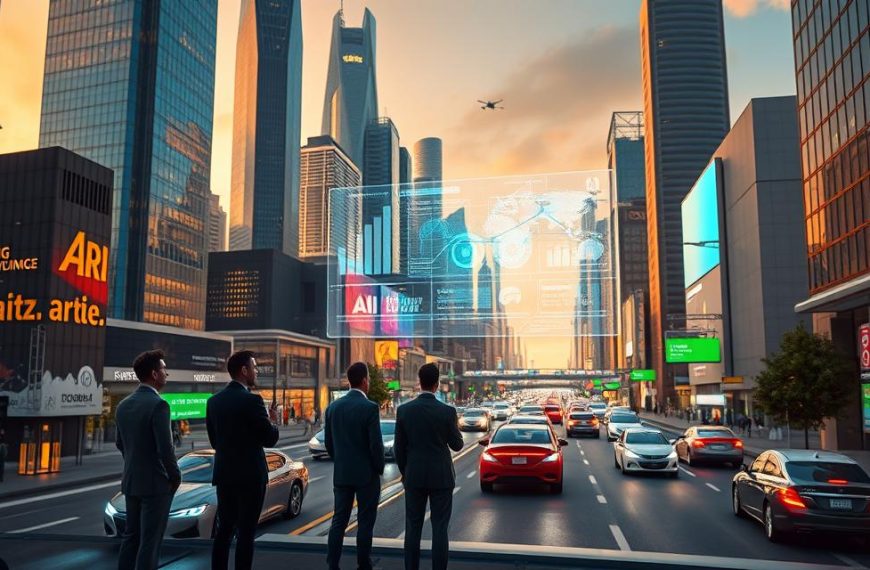Intelligent systems, once in science fiction, now shape real business decisions. The global market for these technologies is growing fast, at 38.1% each year. In the US, companies are leading the way in using these technologies, as Grand View Research shows.
This change marks a big shift. Algorithmic solutions are now key to business success, not just interesting ideas.
US companies are focusing on machine learning adoption to make their work better. Big retailers use models to predict what customers will buy. Hospitals use tools to check medical scans with high accuracy.
Financial companies use AI to spot fraud quickly. This shows how AI is changing the game in many areas.
There are three big trends in business today:
Predictive analytics is guiding 67% of US business plans. It helps companies react fast to changes in the market. Factories use sensors to predict when machines might break down, cutting downtime by 40%.
Service companies use AI to understand what customers think, solving complaints 30% faster.
This change brings both good and bad sides. We will look at how to use AI well, the ethics of it, and the benefits it brings to businesses.
The Evolution of AI in Business Practices
Business operations have changed a lot with artificial intelligence. They moved from simple tasks to making smart decisions. This change shows big steps in technology and a focus on growing, not just saving money.
From Automation to Cognitive Systems
At first, AI was used for simple tasks. Car makers started using robots in the 2010s. These robots made cars 25% faster, as studies show.
These early systems were the start of AI that can learn and improve over time.
Early Applications in Manufacturing and Logistics
Old factories used basic AI for checking welds and packing. Now, AI can predict when machines need fixing, cutting downtime by 40%. Big companies use AI to plan routes that change with weather and traffic.
TD Bank’s AI assistant is a big step forward. It handles 73% of mortgage questions on its own. It also predicts when customers might renew their accounts, helping TD Bank reach out to them in a personal way.
| Feature | Early Automation | Cognitive Systems |
|---|---|---|
| Decision-making | Rule-based | Adaptive learning |
| Data processing | Structured inputs | Multi-format analysis |
| Error rate reduction | 12-15% | 34-42% |
AI’s Role in Digital Transformation
Cloud platforms are key for AI in businesses. AWS SageMaker and Microsoft Azure AI host most corporate AI projects, reports say. This makes it faster to go from idea to action, from 9 months to just 11 days.
Cloud Computing Integration
Big cloud providers have tools for tasks like understanding customer feelings and predicting sales. Retailers using these tools see 27% fewer stockouts. This helps small businesses a lot, as they don’t need to set up their own systems.
Data-Driven Culture Shifts
Now, big companies have chief data officers in 89% of cases, up from 12% in 2015. Procter & Gamble’s AI cut product development time from 24 to 14 months. This change puts a big focus on using data to make decisions, not just on what leaders think.
Key Impacts of AI on Modern Business Operations
Artificial intelligence is now key for making decisions in businesses. It changes how companies work and talk to customers. AI helps in three main ways: making processes smoother, making interactions more personal, and helping teams work better.
Operational Efficiency Improvements
Big companies use AI to fix problems in their operations. Walmart shows how AI can speed up work. It uses smart data to move goods faster and adjust stock levels based on sales.
Energy Consumption Reduction in Manufacturing Through AI Monitoring
AI helps factories save 12-15% on energy. It checks how machines work and adjusts power use when needed. This saves energy without needing people to do it.
| Metric | Traditional Approach | AI-Driven Approach |
|---|---|---|
| Order Fulfilment Speed | 72 hours | 4.5 hours |
| Forecast Accuracy | 68% | 94% |
| Energy Waste | 19% | 6% |
Customer Experience Transformation
AI makes experiences more personal, which keeps customers coming back. Amazon’s system looks at many things about each customer to suggest products. This leads to 35% of sales coming from these suggestions.
24/7 Chatbot Implementations in Banking (Bank of America’s Erica)
Bank of America’s chatbot, Erica, handles millions of chats a year. It solves 82% of problems on its own. Erica uses smart tech to keep an eye on accounts and warn about odd transactions.
Workforce Productivity Enhancements
AI tools help people do their jobs better, not replace them. Salesforce Einstein looks at lots of data to find the best leads. This lets sales teams focus on important talks, not paperwork.
Document Processing Acceleration With UiPath AI-Powered RPA
UiPath’s RPA makes processing documents much faster. It can handle many types of documents and check data against databases. This cuts down on mistakes by 73%.
- Automated CRM updates save 8 hours/week per sales agent
- AI scheduling tools reduce meeting conflicts by 41%
- Machine learning audits cut compliance review times by 68%
Emerging AI Trends Shaping US Industries
American businesses are quickly adopting advanced AI strategies. They aim to solve operational challenges and take on environmental responsibilities. Three key trends are hyperautomation in workflow management, NLP-driven analytics making data easier to understand, and sustainable AI focusing on both efficiency and the environment.
Hyperautomation Adoption
In the US, healthcare providers are using AI to improve workflow. They combine robotic process automation (RPA) with machine learning. This has cut down billing errors by 62% and sped up claim processing.
Process Mining Implementations at Delta Airlines
Delta Airlines used AI to find £23 million in savings each year. They optimised flight operations with AI tools. This shows how automation can lead to real financial gains, as the World Economic Forum’s analysis also found.
AI-Driven Business Analytics
Tableau’s natural language processing lets marketing teams ask complex questions in simple English. A retail company saw its campaign adjustments speed up by 89% thanks to these NLP analytics tools.
Predictive Maintenance in Automotive Manufacturing
Tesla uses neural networks to predict when car parts might fail. This system cut down on unplanned maintenance by 44% in 2023. It also made batteries last 17 months longer on average.
Sustainable AI Implementations
Google’s DeepMind cut cooling energy costs by 40% in 12 US data centres. Walmart’s AI system helped suppliers reduce packaging waste by 31% last year.
AI-Powered Carbon Footprint Tracking
Specialty retailers are now tracking emissions in real time with machine learning. One fashion brand cut its carbon output by 28% in just six months with these sustainable AI solutions.
Challenges and Ethical Considerations
Artificial intelligence is changing how businesses work. Companies face big ethical and operational challenges. They need to balance new tech with responsibility in three key areas: training workers, managing data, and making sure AI decisions are fair.
Workforce Adaptation Requirements
AI is changing job needs fast. IBM’s Watson Academy shows how to train workers for these changes. It helps 71% of people feel more confident in using AI the right way. The program teaches:
- How to understand machine learning
- Working with AI together
- How to make ethical choices in AI scenarios
Change Management in Traditional Industries
Industries like manufacturing and logistics are finding it hard to adapt to AI. A 2023 Deloitte study found 68% of factory managers are struggling. To succeed, they need:
- To introduce AI slowly
- Training from older, more experienced workers
- Tools to check how well things are working
Data Privacy and Security Concerns
GDPR compliance is crucial for AI handling data from Europe. Important steps include:
- Getting clear consent for data use
- Explaining how algorithms work
- Doing thorough impact assessments
Biometric Data Usage Regulations
In the US, companies using facial recognition must follow different state laws. Illinois’ Biometric Information Privacy Act (BIPA) requires:
“Written consent for biometric data and strict rules on how long it can be kept.”
Algorithmic Bias Mitigation
Research from MIT shows AI hiring tools can be unfair to women by 34% in tech jobs. Big companies are now doing:
- Regular checks on facial recognition
- Training data that includes diverse groups
- Getting outside checks on fairness
Equality Impact Assessments in Credit Scoring
After 2022, major US banks started checking for racial bias in credit scoring. They do this by:
- Testing for fairness in AI decisions
- Checking if alternative data is valid
- Sharing information on why some applications are denied
Conclusion
Businesses are at a key moment where they need to innovate and be responsible with AI. Companies like Amazon and Microsoft show how AI can help make better decisions without replacing people. The IMF says 40% of jobs could be changed by AI, making it urgent to adapt.
Success comes from finding the right balance between using AI and training workers. Walmart, for example, uses AI to manage stock better while teaching staff to work with data. This way, they follow ethical rules, especially in finance and healthcare.
Smart companies aim for clear results from AI. They use AI analytics to improve things like supply chains or customer service. IBM shows how combining AI with current systems can lead to better operations and follow rules.
Leaders should work together on using AI. This means training teams across departments and working with regulators on privacy. Google’s AI Principles are a good example of how to manage risks and encourage new ideas.
It’s important to keep checking how AI is used. Regular checks make sure AI helps workers, not replaces them. Companies that focus on using AI the right way will stay ahead in a changing world.
Using AI as a team is what sets leaders apart from followers. The real challenge is not avoiding change but guiding it wisely. This requires vision, flexibility, and a strong focus on working well with AI.










